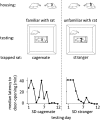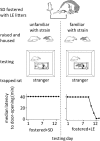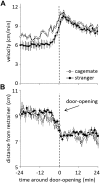Pro-social behavior in rats is modulated by social experience
- PMID: 24424411
- PMCID: PMC3884117
- DOI: 10.7554/eLife.01385
Pro-social behavior in rats is modulated by social experience
Abstract
In mammals, helping is preferentially provided to members of one's own group. Yet, it remains unclear how social experience shapes pro-social motivation. We found that rats helped trapped strangers by releasing them from a restrainer, just as they did cagemates. However, rats did not help strangers of a different strain, unless previously housed with the trapped rat. Moreover, pair-housing with one rat of a different strain prompted rats to help strangers of that strain, evidence that rats expand pro-social motivation from one individual to phenotypically similar others. To test if genetic relatedness alone can motivate helping, rats were fostered from birth with another strain and were not exposed to their own strain. As adults, fostered rats helped strangers of the fostering strain but not rats of their own strain. Thus, strain familiarity, even to one's own strain, is required for the expression of pro-social behavior. DOI: http://dx.doi.org/10.7554/eLife.01385.001.
Keywords: empathy; helping; pro-social behavior.
Conflict of interest statement
PM: Reviewing editor,
The other authors declare that no competing interests exist.
Figures








References
-
- Baden AL, Wright PC, Louis EE, Jr, Bradley BJ. 2013. Communal nesting, kinship, and maternal success in a social primate. Behavioral Ecology and Sociobiology 67:1939–1950. 10.1007/s00265-013-1601-y - DOI
-
- Batson CD, Lishner DA, Cook J, Sawyer S. 2005. Similarity and nurturance: two possible sources of empathy for strangers. Basic and Applied Social Psychology 27:15–25. 10.1207/s15324834basp2701_2 - DOI
Publication types
MeSH terms
Grants and funding
LinkOut - more resources
Full Text Sources
Other Literature Sources
Research Materials

